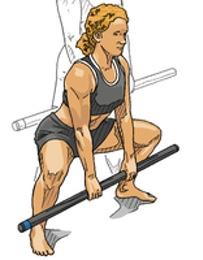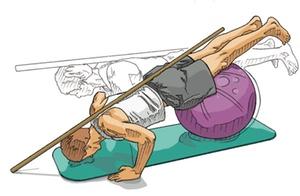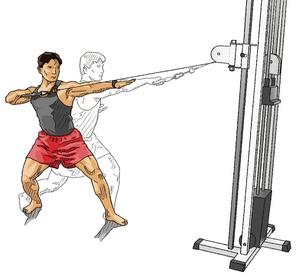Primal Pattern Movements: Bend-Dead Lift
by Paul Chek

 During this series on Primal Pattern® movements, we’ve been exploring the seven most important movement patterns for optimal human functioning:
During this series on Primal Pattern® movements, we’ve been exploring the seven most important movement patterns for optimal human functioning:
- Squat
- Pull
- Gait (walking, jogging, running)
- Lunge
- Bend
- Push
- Twist
From a mother picking up after a child to delivery person picking up a package to a mechanic bending over the hood of a car, the bend pattern is ubiquitous in everyday life. Light items can be picked up with a round-back lifting posture, which is important to use regularly to maintain strength in the spinal ligamentous system.
Heavier objects — those that you cannot pick up at least 20 times in a row or that naturally result in breath-holding for reasons of improved stability — should be lifted with a lordotic lifting posture, where the lumbar curve is maintained to reduce the risk of spinal disk injury.
Bending, particularly when coupled with twisting, is a well-recognized cause of disc herniation, brought about by overload or repeated and excessive wear over a period of time due to dysfunctional musculoskeletal support systems and poor movement patterns. The inner unit is particularly important in the bend pattern. Inactivation of the inner unit in the bend pattern can also lead to injury of the sacroiliac joint, with concurrent back and hip pain.
The Bend-Dead Lift is a great example of a Primal Pattern® Bend.
Bend-Dead Lift
Starting Position: Begin in a Sumo stance with your feet wider than shoulder width and turned out slightly. You should be able to comfortably squat down far enough to touch your hands to the ground.
Hold your weight (bar or dumbbell) in front of your thighs and look forward, head and chest held high. Take a deep diaphragmatic breath and pull your belly button in toward your spine.
Action: Bend forward slightly until the weight is just above your knee. Keep a natural curve in your low back. (If you were to pinch a bit of skin at the level of your low back, you should be able to hold it as you bend forward from the hips.)
As the weight passes your knees, use your legs to lower your body down as far as you can comfortably go. Do not lean forward any more or round your back, and keep your weight equal between the balls of your feet and your heels.
Imagine pushing the ground away from you as you stand back up. As you return to standing, keep your torso upright and maintain the curve in your low back. You should feel your butt and hamstring muscles working with this exercise.
Exhale through pursed lips as you stand up.
Suggested reps: 8-12.
Make it easier: Use body weight, starting with your arms at your sides and letting them fall in between your legs as you drop down.
Make it harder: Use a cable machine, holding the handle in just one hand at a time.
Purpose: Strengthening the body in the bend pattern is vital to help prevent injury during everyday work and sports situations.
Before starting this training program, talk to your health care provider to determine if you’re ready. Also, it’s important to perform each exercise with a moderate tempo. Suggested repetitions for each exercise are listed, but it is more important to follow the Form Principle.
Only select the level of exercise that can be performed with the perfect technique and stop each set before your form breaks down.
Love and chi,
Paul


